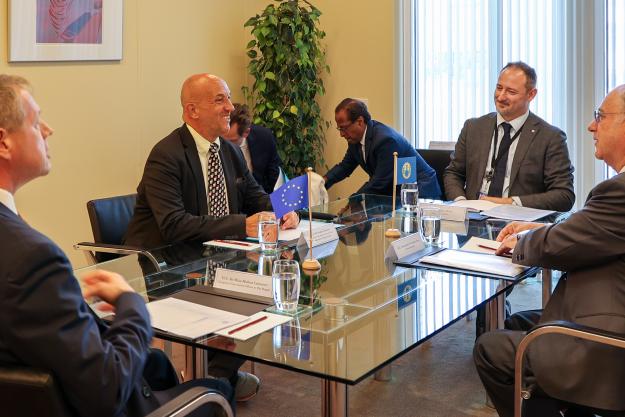THE HAGUE, Netherlands—23 May 2024—The Director-General of the Organisation for the Prohibition of Chemical Weapons (OPCW), Ambassador Fernando Arias, met with the European Union (EU) Special Envoy for Non-Proliferation and Disarmament and Special Advisor on the Iranian Nuclear Issue, H.E. Mr Stephan Klement, on 14 May 2024 at the OPCW Headquarters in The Hague.
The meeting took place in the framework of the recently signed Memorandum of Understanding (MoU) between the OPCW and the EU to enhance collaboration in common areas of interest in accordance with the OPCW programme and the mandate of the Technical Secretariat of the OPCW.
During their meeting, the Director-General and Mr Klement discussed various challenges related to the implementation of the Convention in the current international security environment. The Director-General emphasised the importance of addressing the threat of chemical weapons use to advance international peace and security.
The Director-General highlighted the important role of the OPCW Centre for Chemistry and Technology (ChemTech Centre) in strengthening the Organisation’s capabilities to respond to threats related to the implementation of the Convention, including preventing the re-emergence of chemical weapons. He also underlined risks and opportunities arising from rapid advances in science and technology such as Artificial Intelligence.
“The OPCW is an established and key pillar of the international disarmament and non-proliferation architecture. Building on the long-standing cooperation between the EU and OPCW, the High-Level Consultation brings our dialogue and cooperation on common challenges to a strategic level,” said Mr Klement.
The Director-General stated: “I express my sincere appreciation to the EU for its continuous financial and political support to the activities of the OPCW. The EU is an important stakeholder in achieving our common goal of permanently eliminating any possibility of chemical weapons and ensuring chemistry is used only for peaceful purposes.”

Background
The EU is one of the most active cooperation partners of the OPCW in advancing the objective of a world free of chemical weapons. It is the largest provider of voluntary contributions to the OPCW, supporting capacity building activities, including assistance and protection, verification missions, OPCW activities in Syria, engagement with civil society, and the Centre for Chemistry and Technology (ChemTech Centre).
Since 2004, the OPCW has received a total of EUR 48.5 million in the form of voluntary contributions from the EU, including from the European External Action Service and the European Commission.
As the implementing body for the Chemical Weapons Convention, the OPCW, with its 193 Member States, oversees the global endeavour to permanently eliminate chemical weapons. Since the Convention’s entry into force in 1997, it is the most successful disarmament treaty eliminating an entire class of weapons of mass destruction.
The ChemTech Centre, inaugurated in 2023, enhances the OPCW’s ability to conduct chemical research and analysis. This significantly reinforces the Organisation’s verification regime and inspection capabilities of chemical industries around the world. In addition, an increasing number of capacity-building activities are being delivered through the Centre, including chemical emergency response trainings and analytical skills development courses for experts from Member States.
In 2023, the OPCW verified that all chemical weapons stockpiles declared by the 193 States Parties to the Chemical Weapons Convention since 1997 — totalling 72,304 metric tonnes of chemical agents — have been irreversibly destroyed under the OPCW’s strict verification regime.
For its extensive efforts in eliminating chemical weapons, the OPCW received the 2013 Nobel Peace Prize.
